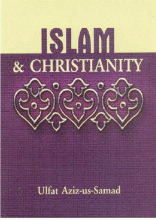Islam & Christianty

The Prophet Muhammad
The Comforter, the Spirit of truth, the Messenger of God, about whose coming Jesus (pbuh) had given the good news, was born in Arabia in the year 571 A.C. At the time of his birth the true Religion had been forgotten or distorted all over the world. T The people among whom he was born, the Ishmaelite Arabs, were polytheists and idolaters. They were sunk in vice and superstitions of every kind. There was no law among them except the law of the jungle and, perchance, a few primitive tribal mores.
Among these people who had drifted far from God's Way, Prophet Muhammad grew up to be a Man of God. He was conspicuous among them by his pure and spotless character, his love of truth and compassion towards the poor and the downtrodden. They called him Al-'Amin the trustworthy, the faithful.
As he grew older the superstitious and evil ways of the people caused greater and greater sorrow to his heart. He spent many hours in communion with his Creator and in meditation on the end or object of man's life. He longed to bring people to the Straight Path, to "render God unto man and man unto God." When he was forty years of age Gabriel, the Messenger of God, shone the Divine light in its full resplendence in Muhammad's heart.
He preached to them One and Only God, the Loving Creator and Sustainer of all the worlds. He exhorted them to shun all kinds of evil and cruelty and to love one another. He told them that real Religion was the removal of the want and suffering of others and the selfless service of fellow-men, that the religious ceremonies were entirely useless if they did not train and
discipline man to become more righteous and to work for the good of others:
(Hast thou observed him who belieth religion? That is he who repelleth the orphan, and urgeth not the feeding 0f the needy. Ah, woe unto worshipers who are heedless of their Prayers; who would be seen or worship, yet refrain from works of mercy!)
(The Qur'an 107)
He struck at the root of the false superiority based on color, caste, race or nationality, declaring that all human beings were equal brothers.
The treatment meted out to the Prophet Muhammad (pbuh) by his people was not different from that meted out to the earlier prophets. He was rejected by people with vested interests and subjected to all kinds of cruelties. Many of those that believed in him were badly tortured. A combined attempt was made by all the tribes of Mecca to put an end to his life. After bearing these tortures and cruelties for thirteen long years with almost superhuman patience and forbearance, Prophet Muhammad (pbuh) at last migrated to Medina, where a large number of
people had already embraced Islam and become his followers. This was the turning point in his life. The people of Medina not only believed in him and his message but also made him the
head of their new Islamic state. Here Prophet Muhammad (pbuh), in addition to his moving appeals for individual change of heart and transformation of character, worked out the social
implications of his message. The many revolutionary changes that he introduced included the raising of women to a position of equality with men, taking steps to abolish slavery, total
prohibition of all kinds of intoxicating drinks and of gambling, putting an end to exploitation of every kind, doing away with priesthood and granting religious freedom to all individuals and
communities, bringing into force the most enlightened code of laws ever known to man and the establishment of a welfare state and a form of administration which was an ideal blend of justice and mercy. He brought into being a universal brotherhood in which there was no distinction whatsoever on the basis of race, color, language, wealth or sex. The distinguishing feature of those who joined this fold was zeal for the Worship of One God and of humanity. After accomplishing his mission, Prophet Muhammad (pbuh) the last prophet of God, departed from this world in the year 632 A.C., leaving behind the Glorious Qur'an which was revealed to him by God, and his own sayings, to guide people for all times to come.
